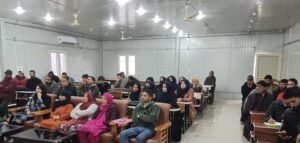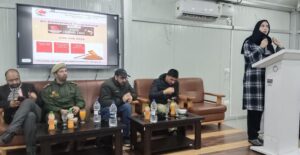Qazigund, Feb 27: The NSS Unit of Government Degree College (GDC) Qazigund, in collaboration with the District Administration and SDPO Qazigund, organized an awareness programme on the three new criminal laws on Thursday. These laws, replacing colonial-era legislations, aim to modernize the legal framework by addressing emerging concerns such as cybercrime, digital fraud, and gender-based offenses. The programme was designed to educate students and the broader community about these significant legal changes and their impact on law enforcement and justice delivery.

The event commenced with a formal welcome address by the I/C Principal, Prof. Aufaq Ahmad Zargar, who emphasized the importance of staying informed about legal reforms and their role in shaping a just society. He highlighted how legal awareness is essential for both students and faculty in understanding their rights and responsibilities. Thereafter, Prof. Nehad Kaniz Fatima (HOD English) introduced the theme of the programme, providing an overview of the new criminal laws and their significance. The event was attended by faculty members, students, and officials from the SDPO office, along with representatives from various departments of Block Qazigund.
The resource persons for the programme were Mohammad Saleem (Sub-Inspector, Police Station Qazigund), Additional Prosecuting Officer Bari, and Dr. Basharat Nazir Reshi from the host college. Saleem elaborated on the importance of Zero FIRs and online FIRs, explaining how these provisions empower citizens to report crimes from anywhere, regardless of jurisdiction. He emphasized how these measures enhance accessibility to justice and expedite legal proceedings.

Bari provided an insightful discussion on various fraudulent practices, such as fake marriage promises, online scams, and cyber frauds, stressing the need for vigilance in an increasingly digital world. He detailed how the new laws introduce stricter measures against such offenses, ensuring better protection for victims.
Later, Dr. Basharat Nazir Reshi, a faculty member from the Political Science Department, delivered a thought-provoking talk on the colonial foundations of previous criminal laws and how the recent amendments reflect India’s evolving legal and social landscape. He highlighted how the updated laws incorporate contemporary issues such as organized crime, gender-sensitive approaches, and enhanced victim rights.
The session concluded with a lively question-and-answer segment, where students actively engaged with the resource persons, raising queries about legal provisions, enforcement mechanisms, and real-life applications of the new laws. A formal vote of thanks was delivered by Prof. Showkat Ahmad Malik, Head of the Department of Education and Programme Coordinator NSS, who expressed gratitude to the resource persons, faculty, and students for their participation in the event while also summarizing the discussion.




